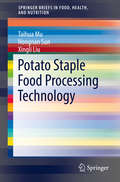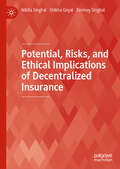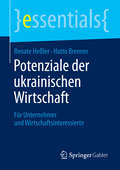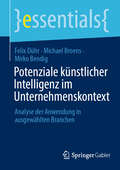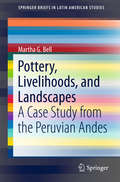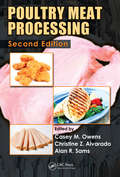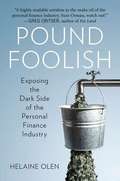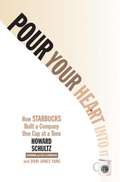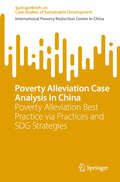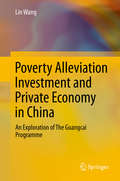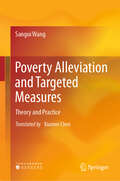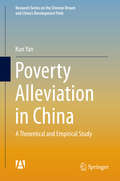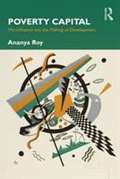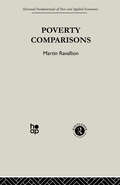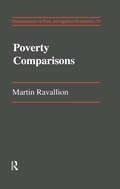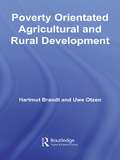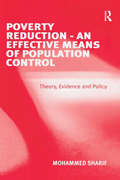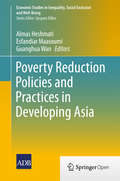- Table View
- List View
Potato Staple Food Processing Technology
by Taihua Mu Hongnan Sun Xingli LiuThis book introduces readers to volatile compounds of staple foods, while also systematically highlighting the processing technologies of potato staple foods, which will be of great importance in promoting the virtuous circle and structural upgrading of Potato consumption patterns are gradually changing from fresh to processed formulations, (e. g. mashed potatoes, potato chips, etc. ) as a result of fast food habits adopted from developed countries. If the potato can be used to make staple foods, it will not only provide energy, but also nutrition. Though the book is primarily intended for researchers and students in the field of food technology, it will also be of interest to commercial research staff in food technology.
Potential Growth of Australia and New Zealand in the Aftermath of the Global Crisis
by Yan SunA report from the International Monetary Fund.
Potential Yields of Major Crops for Chinese and Global Food Security Under Climate Change
by Chengzhi Cai Wenfang CaoThis book analyzes potential yields of six major food crops - rice, wheat, maize, potato, soybean and rapeseed worldwide using both qualitative and quantitative approaches to study both China’s and global food security under climate change. Firstly, it reviews previous studies on potential yields of rice, wheat, maize, potato, soybean and rapeseed worldwide to provide a detailed information of studying on China’s and global food security based on the product’s supply and demand of these crops. Secondly, average and top (national) yields of rice, wheat, maize, potato, soybean and rapeseed since 1961 on global scale are employed to analyze their temporal and spatial variation trends and potential limits. Thirdly, the effects of global warming in climate change on both average and top yields of rice, wheat, maize, potato, soybean and rapeseed since 1961 at global level are analyzed using regression model, and their differences between average and top yields among these crops are identified and compared. Fourthly, the yields and per capita quantity of rice, wheat, maize, potato, soybean and rapeseed in major producer-countries and the world are analyzed to assess the situation and trend of international trade for the products of these crops, respectively.Fifthly, potential yields of rice, wheat, maize, potato, soybean and rapeseed worldwide by 2030 are projected using both trend-regressed models and ARIMA models to estimate the per capita quantity of these crops based on the projection of world population and assess the status of Chinese and global food security in that future. Finally, it provides policy implications and advice on food security for China and the world directing food production by 2030 under climate change.
Potential, Risks, and Ethical Implications of Decentralized Insurance (Technology, Work and Globalization)
by Nikita Singhal Shikha Goyal Tanmay SinghalThis book provides a comprehensive and in-depth exploration of decentralized insurance, its impact on the insurance sector, its ethical implications, and its potential to transform the insurance industry. It explores the underlying technologies, such as blockchain, smart contracts, and DApps, that drive the decentralization of insurance services. Additionally, it examines various decentralized insurance models, including Peer-to-Peer, Parametric, and On-Demand Insurance, and their benefits and ethical considerations. It also addresses the challenges and opportunities for innovation and sustainability in the context of decentralized insurance. Its didactic approach, global perspective, and forward-looking vision will provide readers with valuable knowledge to grasp decentralized insurance's complexities, potentials, and challenges, making it a valuable resource for academics, industry professionals, policymakers, and blockchain enthusiasts.
Potentials, Challenges and Prospects of Halal Tourism Development in Ethiopia (Routledge Insights in Tourism Series)
by Atilla Akbaba Mohammed Jemal AhmedThis book explores the potential of halal tourism development and its implementation in Ethiopia. The insights presented assist key stakeholders to make informed decisions concerning commercial strategy, profitability and feasibility of halal tourism from the secular perspective. This innovative book offers a unique contribution to halal tourism, being the first of its kind to assess halal tourism development in developing countries. It provides a clear understanding of what halal tourism means, how it has evolved and the current status of the industry. The book considers the prospects of halal tourism, including the conceptual and practical challenges of halal tourism development. The example of halal tourism in Ethiopia is explored to provide a lens through which deeper understandings can be drawn on where and how to develop halal tourism This book will be of interest to, researchers, students in the disciplines of tourism, anthropology, geography, business administration and sociology. It also provides useful insights for policy makers, planners and professionals in the hospitality and tourism industry.
Potenziale der ukrainischen Wirtschaft: Für Unternehmer und Wirtschaftsinteressierte (essentials)
by Hatto Brenner Renate HeßlerDas essential zeigt in kompakter Form die Geschaftschancen auf, die sich in der Ukraine bieten, und gibt detaillierte und praxisorientierte Hinweise zu wichtigen Aspekten wie Wirtschaftslage, Arbeitsmarkt, Infrastruktur, Investitionsschutz, Zahlungsverkehr und gesetzlichen Regelungen. Renate Hessler und Hatto Brenner informieren ausfuhrlich uber Vorteile wie das hohe Bildungsniveau und die niedrigen Steuern, klaren aber auch uber Herausforderungen wie die instabile politische Lage und die burokratischen Hurden auf. Eine ubersichtliche SWOT-Analyse rundet die Ausfuhrungen ab. Auf diese Weise hilft der Ratgeber dabei, im Geschaft mit der Ukraine Potenziale optimal zu nutzen und Klippen sicher zu umschiffen. "
Potenziale künstlicher Intelligenz im Unternehmenskontext: Analyse der Anwendung in ausgewählten Branchen (essentials)
by Felix Dühr Michael Broens Mirko BendigIn der künstlichen Intelligenz (kurz KI) konnten in den vergangenen Jahren weitreichende Fortschritte erzielt werden. Durch die Untersuchung von Unternehmen in unterschiedlichen Branchen werden Muster und typische Anwendungsweisen von KI identifiziert, wodurch die Ableitung von sowohl branchenspezifischen als auch allgemeinen, branchenübergreifenden Ansätzen bzw. Handlungsempfehlungen möglich wird.
Potenziale und Herausforderungen der Additiven Fertigung: Gesellschaft – Wirtschaft – Wissenschaft und Transfer (FOM-Edition)
by Justus Bobke Thomas Russack Joachim WeinholdDieses Buch beschreibt den Rahmen und den aktuellen Stand der Additiven Fertigung (3D-Druck) in Deutschland. Es bringt Entscheiderinnen und Entscheidern aus Politik, Wirtschaft und Wissenschaft die Potenziale und Herausforderungen der Additiven Fertigung nahe. Diese können in richtungweisende Entscheidungen einfließen, um den Standort Deutschland und Europa zu stärken. Ausgewiesene Expertinnen und Experten identifizieren globale Hotspots der vergangenen Jahre, aus denen wichtige Impulse für die Additive Fertigung hervorgegangen sind. Die Autorinnen und Autoren zeigen, wie sich die Additive Fertigung entwickelt hat und voraussichtlich entwickeln wird. Dabei berücksichtigen sie gesellschaftliche, wirtschaftliche und technische Aspekte sowie ausgewählte Anwendungsfälle in einzelnen Branchen, um einen Gesamteindruck zu vermitteln.
Potenzialentfaltung und Burnout-Prävention im Vertrieb: Mit den Grundsätzen des Leistungssports zur Balance zwischen Erfolg und Gelassenheit
by Peter HuberMitarbeiter im Verkauf sind Siegertypen und bereit, bis an die Grenzen ihres körperlichen und psychischen Potenzials zu gehen. Dabei gerät die Balance aus Einsatz und Ergebnis oft in eine Schieflage, was sogar im Burnout enden kann. Das muss nicht sein!In diesem Trainingsprogramm zeigt Peter Huber Schritt für Schritt auf, welche Tools sich für ein individuelles Zeit- und Kundenmanagement eignen, wie Sie Stress reduzieren und welche Maßnahmen Sie zur Leistungssteigerung ergreifen können. Dazu verwendet er das Modell der „Big Five“ der Persönlichkeitspsychologie sowie Ansätze aus verschiedenen Sportwelten und leitet daraus Umsetzungspläne für den Verkauf ab. Ein Leitfaden mit hilfreichen Modulen, um psychisch stark und resilient zu werden, eine nachhaltige persönliche Erfolgs- und Zufriedenheitsstrategie zu etablieren und bei Bedarf die richtigen Konsequenzen zu ziehen.Mit Interviews von: Dr. Robert Fritz, SPORTordination, Wien; Marcel Puchinger, Fischer Sports; Patrick Schörkmayer, IRONMAN Austria; Dr. David Müller, Nationale Anti-Doping-Agentur NADA Austria; Katja Rügner, Polar Deutschland; Martina Saller, Microsoft Österreich; Benedikt Böhm, Dynafit; Christoph Strasser, sechsfacher und amtierender RAAM-Sieger; Mario Schindlmayr, Würth Österreich; Peter Klinglmüller, SK Rapid Wien; Michael Koller, SPORTordination, Wien; Stefan Moser, Audi AG.
Pottery, Livelihoods, and Landscapes
by Martha G. BellThis book describes the pottery trade activities of the residents of the community of San Bartolom#65533; de los Olleros in Piura, Peru. Based on extensive interviews with potters and traders, it explains why the barter of pots continues to be practiced, and explores how pottery production and exchange practices may now be changing. The book provides a unique and detailed analysis of the interconnections between handicraft production, rural trade networks, and agriculture in an Andean context. Pots are mainly bartered for food crops within a non-monetary peasant economy distinct from the "conventional" market. This practice is an important food source for pottery traders; thus trader livelihoods are placed at the center of this qualitative study of pottery distribution. Of primary importance are: 1) the decision-making processes surrounding exchange activities, 2) how exchange choices produce distinct spatial patterns, and 3) how the marketing of pots impacts livelihoods.
Poultry Meat Processing (South America, Central America and the Caribbean)
by Casey M. OwensWhen the first edition of Poultry Meat Processing was published, it provided a complete presentation of the theoretical and practical aspects of poultry meat processing, exploring the complex mix of biology, chemistry, engineering, marketing, and economics involved. Upholding its reputation as the most comprehensive text available, Poultry Meat Pro
Poultry Production in Hot Climates (2nd edition)
by Nuhad J. DaghirThe poultry industry continues to expand in the warm regions of the world at a much faster rate than in temperate zones. Not only can it be quickly and easily developed in these hot climates but poultry meat and eggs can serve as important sources of animal protein in those areas of the world that have protein insufficiency.
Pound Foolish: Exposing the Dark Side of the Personal Finance Industry
by Helaine OlenIf you've ever bought a personal finance book, watched a TV show about stock picking, listened to a radio show about getting out of debt, or attended a seminar to help you plan for your retirement, you've probably heard some version of these quotes:"What's keeping you from being rich? In most cases, it is simply a lack of belief." --SUZE ORMAN, The Courage to Be Rich"Are you latte-ing away your financial future?" --DAVID BACH, Smart Women Finish Rich"I know you're capable of picking winning stocks and holding on to them." --JIM CRAMER, Mad MoneyThey're common refrains among personal finance gurus. There's just one problem: those and many similar statements are false.For the past few decades, Americans have spent billions of dollars on personal finance products. As salaries have stagnated and companies have cut back on benefits, we've taken matters into our own hands, embracing the can-do attitude that if we're smart enough, we can overcome even daunting financial obstacles. But that's not true.In this meticulously reported and shocking book, journalist and former financial columnist Helaine Olen goes behind the curtain of the personal finance industry to expose the myths, contradictions, and outright lies it has perpetuated. She shows how an industry that started as a response to the Great Depression morphed into a behemoth that thrives by selling us products and services that offer little if any help.Olen calls out some of the biggest names in the business, revealing how even the most respected gurus have engaged in dubious, even deceitful, practices--from accepting payments from banks and corporations in exchange for promoting certain products to blaming the victims of economic catastrophe for their own financial misfortune. Pound Foolish also disproves many myths about spending and saving, including: Small pleasures can bankrupt you: Gurus popularized the idea that cutting out lattes and other small expenditures could make us millionaires. But reducing our caffeine consumption will not offset our biggest expenses: housing, education, health care, and retirement. Disciplined investing will make you rich: Gurus also love to show how steady investing can turn modest savings into a huge nest egg at retirement. But these calculations assume a healthy market and a lifetime without any setbacks--two conditions that have no connection to the real world. Women need extra help managing money: Product pushers often target women, whose alleged financial ignorance supposedly leaves them especially at risk. In reality, women and men are both terrible at handling finances. Financial literacy classes will prevent future economic crises: Experts like to claim mandatory sessions on personal finance in school will cure many of our money ills. Not only is there little evidence this is true, the entire movement is largely funded and promoted by the financial services sector.Weaving together original reporting, interviews with experts, and studies from disciplines ranging from behavioral economics to retirement planning, Pound Foolish is a compassionate and compelling book that will change the way we think and talk about our money.
Pour Your Heart Into It: How Starbucks Built a Company One Cup at a Time
by Howard SchultzThe success of Starbucks Coffee Company is one of the most amazing business stories in decades. What started as a single store on Seattle's waterfront has grown into a company with over sixteen hundred stores worldwide and a new one opening every single business day. Just as remarkable as this incredible growth is the fact that Starbucks has managed to maintain its renowned commitment to product excellence and employee satisfaction.In Pour Your Heart Into It, CEO Howard Schultz illustrates the principles that have shaped the Starbucks phenomenon, sharing the wisdom he has gained from his quest to make great coffee part of the American experience. Marketers, managers, and aspiring entrepreneurs will discover how to turn passion into profit in this definitive chronicle of the company that "has changed everything . . . from our tastes to our language to the face of Main Street." (Fortune)
Poverty Alleviation Case Analysis In China: Poverty Alleviation Best Practice via Practices and SDG Strategies (SpringerBriefs on Case Studies of Sustainable Development)
by Intl Poverty Reduction Center In ChinaThis book offers comprehensive analysis for individual cases of poverty alleviation to facilitate respective in-depth key learnings and an overview of poverty alleviation strategies carried out in China. Best practices were selected from representative cases in China to demonstrate the development of different approaches in the poverty alleviation journey with collective stakeholders’ efforts – Government, Industry, Academia, and Research, plus the local stakeholders engaged in the rural development activities. Overseas cases are referenced to show the outcome of similar strategies as comparison with the consideration of regional specific conditions. Through better understanding of the focal issues, areas and organizations – and their respective key challenges and solutions – there is the compilation for each case its analysis, comparative studies and SDG relevance. These aim at engaging the readers from institutes, governments, corporates, or social enterprises, to think about how to adopt the related SDG strategies. They also serve as the initiatives to facilitate potential cross-region and cross-disciplinary collaboration. The book acts as the guide on how: - Poverty Reduction is one of the key goals in SDGs – while solving this key challenge, multiple goals could be planned and tackled together to make an effective solution. - Multi-disciplinary strategies are put in place, demonstrated via success stories and best practices. Key driving factors are identified with the consideration of the driving organization nature. - A system could be developed to engage different stakeholders in the society for industry development – and to avoid returning to poverty in the long term. - Future international cooperation could be facilitated to create a poverty alleviation framework applicable across different regions.
Poverty Alleviation Investment and Private Economy in China
by Lin WangThis book explores the mechanisms and significance of China's private economy participating in poverty alleviation. By basing its analysis on theories of development economics and public economics, the book stresses practical significance and abandons unreasonable assumptions. It uses a systematic set of statistical analysis tools and descriptive statistics to provide a multidimensional and highly visual format. Beyond the traditional qualitative comparison of countries, it also introduces quantitative comparison. Considering the increasing concern and curiosity about China's booming economy and rising private sector, the book is highly topical, offering readers theoretical insights into China's poverty alleviation mechanisms and essential information on the role played by the private economy in social and economic development.
Poverty Alleviation and Targeted Measures: Theory and Practice
by Sangui WangThis book examines China’s remarkable success in reducing poverty the largest and most significant effort of poverty alleviation in human history. It begins by outlining the background of poverty alleviation in China, systematically analyzing its organizational and policy frameworks, and detailing the implementation models and pathways of targeted poverty alleviation. Next, it addresses the challenges and practices associated with poverty alleviation in China, summarizing the experiences that illustrate not only significant achievements in poverty reduction but also far-reaching political, social, and international implications. Finally, at a pivotal moment in the CPC’s pursuit of its second centenary goal, the book connects poverty alleviation with rural revitalization, which is essential for the next phase of agricultural and rural development in China. It offers a forward-looking analysis of relative poverty alleviation and proposes specific strategies to address these challenges.
Poverty Alleviation in China
by Kun YanThis study systematically investigates the development process, major characteristics and weak links of China's poverty alleviation experience and conducts a comparative analysis of poverty alleviation cases. It also accurately presents the internal logic and core elements of China's poverty alleviation theory and taking the Chinese experience of poverty alleviation refines the "Two Threads One Force" theoretical framework to make a basic judgment of the "China model" for poverty alleviation. It also presents the rationale and plans for responding to new challenges to achieve poverty alleviation goals, which will enhance the welfare of the people and promote social progress and national prosperity.
Poverty Capital: Microfinance And The Making Of Development
by Ananya RoyWinner of the 2011 Paul Davidoff award! This is a book about poverty but it does not study the poor and the powerless; instead it studies those who manage poverty. It sheds light on how powerful institutions control "capital," or circuits of profit and investment, as well as "truth," or authoritative knowledge about poverty. Such dominant practices are challenged by alternative paradigms of development, and the book details these as well. Using the case of microfinance, the book participates in a set of fierce debates about development - from the role of markets to the secrets of successful pro-poor institutions. Based on many years of research in Washington D. C. , Bangladesh, and the Middle East, Poverty Capitalalso grows out of the author's undergraduate teaching to thousands of students on the subject of global poverty and inequality.
Poverty Comparisons: A Guide To Concepts And Methods (Living Standards Measurement Study Working Papers #No. 88)
by M. RavallionPoverty comparisons - such as whether poverty has increased, or where it is greatest, are typically clouded in conceptual and methodological uncertainties. How should individual well-being be assessed in deciding who is poor? Is a household survey a reliable guide? Where should the poverty line be drawn, and does the choice matter? This monograph surveys the issues that need to be considered in answering these questions, providing an accessible introduction to the most recent literature. The strengths and weaknesses of past methods are discussed, and a summary of methodological recommendations is given. A number of new analytical tools are described which can greatly facilitate poverty comparisons, recognising the uncertainties involved.
Poverty Comparisons: A Guide To Concepts And Methods (Living Standards Measurement Study Working Papers #No. 88)
by Martin RavallionFirst published in 1994. Routledge is an imprint of Taylor & Francis, an informa company.
Poverty Law and Legal Activism: Lives that Slide Out of View
by Adam GeareyLinking critical legal thinking to constitutional scholarship and a practical tradition of US lawyering that is orientated around anti-poverty activism, this book offers an original, revisionist account of contemporary jurisprudence, legal theory and legal activism. The book argues that we need to think in terms of a much broader inheritance for critical legal thinking that derives from the social ethics of the progressive era, new left understandings of "creative democracy" and radical theology. To this end, it puts jurisprudence and legal theory in touch with recent scholarship on the American left and, indeed, with attempts to recover the legacies of progressive era thinking, the civil rights struggle and the Great Society. Focusing on the theory and practice of poverty law in the period stretching from the mid-1960s to the present day, the book argues that at the heart of both critical and liberal thinking is an understanding of the lawyer as an ethical actor: inspired by faith or politics to appreciate the potential and limits of law in the struggle against economic inequality.
Poverty Orientated Agricultural and Rural Development (Routledge Studies in Development and Society)
by Hartmut Brandt Uwe OtzenOver the last twenty years the proportion of development cooperation resources earmarked for agricultural development has dwindled to between six and seven per cent of total bi- and multilateral Official Development Assistance. This is despite the fact that eighty per cent of the world's poor live in rural agricultural areas and that the poor are disproportionately affected when political, military and natural events lead to regional or global food shortages. Brandt and Otzen's key book fills a gap in current literature, undertaking a wide-ranging conceptual reorientation of development cooperation, criticizing the current orthodoxy and its bias towards urban areas, and arguing that in order to effectively alleviate poverty across the world, agricultural and rural development measures need to be implemented both by central and subnational governments, aid agencies and the private sector. The authors investigate the world food question, the current pressures it is under and its link to rural poverty, and set out the policies that need to be undertaken to reduce global poverty.
Poverty Reduction - An Effective Means of Population Control: Theory, Evidence and Policy
by Mohammed SharifThis book contends that high fertility is rational in that it achieves short term economic benefit and long term old age-support for families. Wider macroeconomic effects are not the concern of the individual family. This means that the fertility choices of the poor are not a result of ignorance. The objective of this book is to drive home the fact that it is poverty that is responsible for high fertility and that until the problem of poverty is effectively dealt with the problem of high fertility will continue to persist. The book concludes with a series of policy recommendations for the eradication of poverty.
Poverty Reduction Policies and Practices in Developing Asia
by Almas Heshmati Esfandiar Maasoumi Guanghua WanThis book looks at the major policy challenges facing developing Asia and how the region sustains rapid economic growth to reduce multidimensional poverty through socially inclusive and environmentally sustainable measures. Asia is facing many challenges arising from population growth, rapid urbanization, provision of services, climate change and the need to redress declining growth after the global financial crisis. This book examines poverty and related issues and aims to advance the development of new tools and measurement of multidimensional poverty and poverty reduction policy analysis. The book covers a wide range of issues, including determinants and causes of poverty and its changes; consequences and impacts of poverty on human capital formation, growth and consumption; assessment of poverty strategies and policies; the role of government, NGOs and other institutions in poverty reduction; rural-urban migration and poverty; vulnerability to poverty; breakdown of poverty into chronic and transitory components; and a comparative study on poverty issues in Asia and other regions. The book will appeal to all those interested in economic development, resources, policies and economic welfare and growth.
